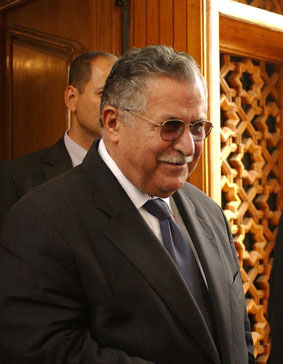Jalal Talabani

| |
|---|---|
| Date of Birth: | 1933 |
| State President of Iraq | |
| Tenure Order: | 1st President |
| Took Office: | April 7, 2005 – In Office |
| Predecessor: | Ghazi Mashal Ajil al-Yawer |
Jalal Talabani (in Arabic: jalâl at-tâlabânî) (born 1933), Iraqi politician, was named President of Iraq on April 6, 2005 by the Iraqi National Assembly. Talabani is founder and secretary general of one of the main Iraqi Kurdish political parties, the Patriotic Union of Kurdistan (PUK). He was a prominent member of the Interim Iraq Governing Council, which was established following the overthrow of the Saddam Hussein regime by the U.S.-led invasion of Iraq in 2003.
Early life
Talabani was born in the village of Kelkan in Iraqi Kurdistan. He joined the Kurdish Democratic Party (KDP) at the age of 14, and was elected to the party's central committee at the age of 18 in 1951. He entered law school in 1953 and graduated in 1959, after which he was conscripted into the Iraqi army as a commander of a tank unit.
He was the head of the KDP politburo during the 1960s, and an emerging figure in Kurdish politics. When the Kurds launched an armed uprising against the Iraqi government in 1961, Talabani led battles at home in Iraq, as well diplomatic missions to Europe and elsewhere in the Middle East to seek support for the Kurds.
After the collapse of the Kurdish revolt in 1975, he left the KDP to create what he described as a "more educated, democratic and less tribal" political party. This led to the formation of the Patriotic Union of Kurdistan in 1975.
Under his leadership, the PUK quarreled with Massoud Barzani's KDP after the Gulf War in 1991. In 1992, elections were held in Iraqi Kurdistan and a PUK-KDP joint administration was formed, but tensions between the two groups led to armed confrontations in ]1994. Both parties signed a peace deal in Washington in 1998, and Talabani proposed a law banning and criminalizing inter-Kurdish fighting.
Talabani has since reconciled with Barzani. The KDP-PUK joint election slate, the Democratic Patriotic Alliance of Kurdistan, swept the Kurdish National Assembly election, as well as winning 77 seats in the Iraqi National Assembly.
At the time of the 2003 invasion of Iraq, Talabani continued to lead the PUK and was a leading member of the Iraqi opposition which remained within the country during the rule of Saddam Hussein. After Saddam's overthrow he was appointed a leading member of the Interim Iraq Governing Council and held the presidency during the month of November 2003. He has distanced himself from the movement for Kurdish independence, pledging to support Iraqi federalism, at least for the time being.
Following the Iraqi elections on 30 January, 2005, Talabani was named President of Iraq under the Iraqi Transitional Government by the transitional National Assembly on 6 April.
Talabani is decended from the notable Talabani tribe, which has a long history of producing politicans and intellectuals as well as other influential members of Kurdish society. His political views - as expressed in interviews with Western media - stay unclear beyond the obvious intention of winning and conserving power for his tribe.
Timeline
1947 Joined the Kurdistan Democratic Party
1953 Elected to the KDP central committee
1954 Elected as the Secretary General of the Kurdistan Students Union
1961 Head of the KDP Peshmerga
1975 Founded the Patriotic Union of Kurdistan
2005 Elected President of Iraq
